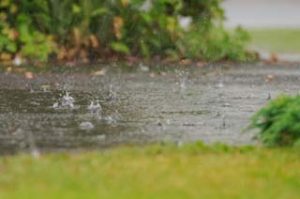How Will All the Rain Affect My Lawn?
As you’ve seen the record rainfalls over the past few months, you are probably wondering “how will all this rain affect my lawn?” To be completely honest, I’ve wondered the same thing myself. The amount of rain we’ve been getting is unprecedented and so there is no exact answer but I can tell you a few of the things I know.
First, to put your mind at ease, it is not going to kill your grass. We have had some flash flooding which is not necessarily good for your lawn, but it is not detrimental in most cases either. The grass should still green up just fine when the weather warms up. In most places the water has only been on a lawn for a few days. That is not enough to do permanent damage. Now if the grass were coming out of dormancy, it could be a different story, but so far we shouldn’t see any lawns lost to flooding.
Heavy rainfall and flooding will cause soil compaction. When we get heavy downpours on ground that is already saturated, the rain literally just beats the ground and rolls off. We don’t often think about the weight of water when it rains, but it adds up. A gallon of water weighs 8 lbs. If you think about how many gallons of water fell on your lawn, that is a lot of weight and it is steadily compacting the soil.
One of the best things you can do for a compacted lawn is aerate it. When you aerate a lawn, you are pulling cores from the soil opening the ground up. This not only relieves compaction, it also allows water and air easier access to the root system of your grass which will make it thicker and healthier. You can read more about the benefits of aeration by clicking the following link or copy and paste it into your browser. https://www.southernlawnandpest.com/aeration-services/
The other concern I have, is how the rain and flooding will affect our pre-emerges. First, I want to reassure you that we will continue to back our lawn treatments with our 100% satisfaction guarantee. So if you have weeds come up in your lawn within 5 weeks of our original application, let us know and we will come back to treat those problem areas again. Typically, pre-emergents need to be watered in to be activated, and they bind tightly to the soil. So they should be fine, but as we talked about above. There isn’t anything typical about the amount of rain we’ve been getting lately. This is a year where it is absolutely essential that pre-emergents are split into two separate applications, because if some of the first one does get washed away, we will have another application to protect your lawn.
My advice for people concerned about whether the pre-emergents will work is to wait and see. Trust us and know that we will come back if we need to. Unfortunately, it isn’t as easy as just putting down more pre-emergent. Since they do bind tightly to the soil and there is a good chance they haven’t leached out, if we apply more we run the risk of damaging your lawn. Pre-emergents are great, but the one negative side effect is that they do inhibit root growth for a short period of time. If we put down too much it will keep the roots of your grass from growing which could have a very serious impact on your lawn.
I hope this article was helpful in explaining some of the possible outcomes from the heavy rainfall and flooding we’ve experienced. I also hope that it helped to calm some fears about how the heavy rains will affect your lawn. If you have any questions or concerns please don’t hesitate to reach out to us. We are your lawn experts and want to make sure you know that we are here to help you.
Until next time,
Steve Clark


